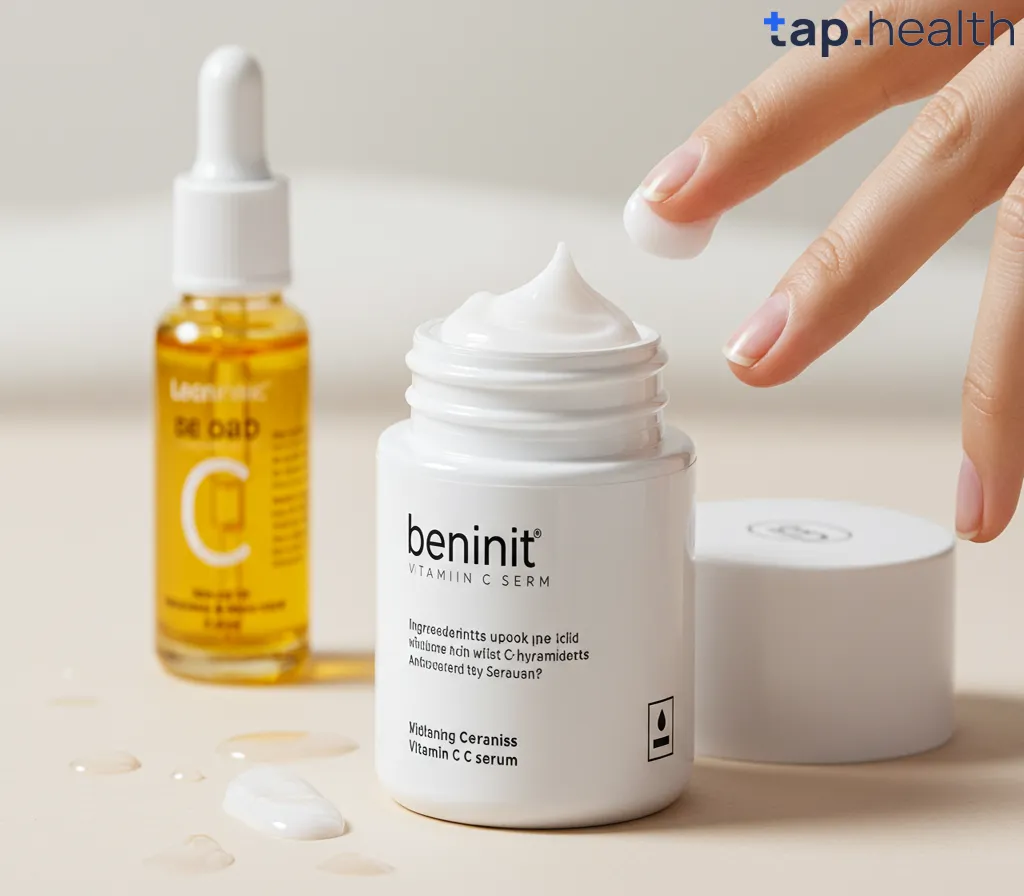Vitamin C serum is a staple in many skincare routines due to its powerful antioxidant properties and ability to brighten the skin. However, to get the most out of this serum, it’s essential to pair it with the right moisturizer. While Vitamin C can provide significant benefits, it needs support from a good moisturizer to lock in hydration, prevent irritation, and promote healthy, glowing skin.
In this blog post, we will explore how to choose the best moisturizer to pair with Vitamin C serum, why the right moisturizer matters, and how to layer these two products for maximum effectiveness. Whether you’re a skincare newbie or a seasoned pro, this guide will help you understand the best ways to enhance your skincare routine.
Why Should You Use a Moisturizer with Vitamin C Serum?
Using a Vitamin C serum without a moisturizer might not give you the full benefits. Here’s why moisturizing is essential when using Vitamin C:
1. Hydration Balance
Vitamin C is known for its ability to brighten the skin, reduce fine lines, and protect against free radical damage. However, it can sometimes leave the skin feeling dry or tight. A good moisturizer will help keep your skin hydrated and prevent this dryness. Hydration is crucial for maintaining a healthy skin barrier, which is essential for the overall health of your skin.
2. Soothing and Calming
While Vitamin C can be highly effective, it can also cause irritation, especially for those with sensitive skin. The right moisturizer can soothe and calm the skin, reducing redness and irritation that may result from using Vitamin C serum. It also helps to lock in the benefits of Vitamin C without causing any adverse reactions.
3. Enhanced Absorption
A moisturizer can help Vitamin C serum absorb more effectively into the skin. By applying a moisturizer after the serum, you create a protective barrier that helps to seal in the active ingredients, ensuring maximum absorption and efficacy.
4. Protection Against External Damage
Moisturizers also help form a barrier against environmental pollutants, preventing harmful elements from penetrating the skin and causing damage. This is especially important when you are using a powerful antioxidant like Vitamin C, as it can further protect your skin from free radical damage and UV radiation.
What Are the Best Types of Moisturizers to Pair with Vitamin C Serum?
When choosing a moisturizer to use with Vitamin C serum, it’s essential to consider your skin type and the specific benefits you want to achieve. Here’s a breakdown of different types of moisturizers and how they work with Vitamin C.
1. Gel-Based Moisturizers: Best for Oily Skin
Gel-based moisturizers are lightweight and provide hydration without being greasy, making them ideal for those with oily or acne-prone skin. These moisturizers are often packed with hydrating ingredients like hyaluronic acid, which pairs well with Vitamin C to offer deep hydration while maintaining a matte finish.
Key Benefits:
- Lightweight texture: Perfect for oily or combination skin types.
- Non-comedogenic: Will not clog pores.
- Hydrating: Contains ingredients like glycerin and hyaluronic acid that help maintain moisture balance.
Recommended Products:
- Neutrogena Hydro Boost Water Gel: A popular, lightweight gel moisturizer that hydrates and pairs well with Vitamin C serums.
- Clinique Moisture Surge 72-Hour Auto-Replenishing Hydrator: Offers long-lasting hydration without feeling heavy on the skin.
2. Cream-Based Moisturizers: Best for Dry Skin
Cream-based moisturizers are thicker and richer than gel-based ones, making them ideal for dry skin. They help to lock in moisture and restore the skin’s barrier, providing a more substantial layer of protection, which is essential when using a potent ingredient like Vitamin C.
Key Benefits:
- Rich texture: Ideal for dry or dehydrated skin.
- Deep hydration: Contains emollients and fatty acids that nourish the skin.
- Skin barrier support: Helps restore the skin’s natural moisture balance.
Recommended Products:
- CeraVe Moisturizing Cream: A non-greasy, rich formula that is perfect for pairing with Vitamin C serums for long-lasting hydration.
- La Roche-Posay Toleriane Double Repair Face Moisturizer: Offers a balance of hydration and soothing properties for dry and sensitive skin.
3. Oil-Based Moisturizers: Best for Sensitive Skin
For those with sensitive skin, oil-based moisturizers can provide additional nourishment while soothing irritation. These moisturizers often contain natural oils such as jojoba oil or argan oil, which are excellent for calming the skin and helping to maintain a healthy moisture balance.
Key Benefits:
- Soothing: Helps reduce redness and irritation caused by Vitamin C serum.
- Rich in antioxidants: Natural oils have their own skin benefits, such as protection against free radicals.
- Moisture retention: Ideal for dry and sensitive skin types.
Recommended Products:
- Josie Maran 100% Pure Argan Oil: A hydrating oil that can deeply nourish and hydrate the skin, perfect for those using Vitamin C serum.
- The Ordinary 100% Organic Cold-Pressed Rose Hip Seed Oil: A gentle and soothing option that complements the brightening effects of Vitamin C.
4. Non-Comedogenic Moisturizers: Best for Acne-Prone Skin
If you have acne-prone skin, look for moisturizers labeled as non-comedogenic. These products are designed to hydrate the skin without clogging pores, which is crucial when you’re using Vitamin C, as it can sometimes trigger breakouts for those with sensitive or acne-prone skin.
Key Benefits:
- Won’t clog pores: Ideal for those prone to acne or blackheads.
- Oil-free formulas: Most non-comedogenic moisturizers are lightweight and oil-free.
- Light hydration: Provides enough moisture to keep the skin balanced without causing excess oil.
Recommended Products:
- EltaMD AM Therapy Facial Moisturizer: A non-comedogenic, lightweight formula that hydrates the skin while being suitable for acne-prone skin.
- Neutrogena Oil-Free Moisture: A basic, non-comedogenic moisturizer that works well with Vitamin C serums.
How to Layer Vitamin C Serum and Moisturizer
To maximize the benefits of both Vitamin C serum and your moisturizer, it’s important to know how to layer them properly. The correct layering technique ensures that both products work effectively, providing maximum hydration and skin protection.
Step 1: Cleanse Your Skin
Start with a gentle cleanser to remove dirt, oil, and impurities from your skin. This will create a clean base for the serum and moisturizer to absorb effectively.
Step 2: Apply Vitamin C Serum
After cleansing, apply a few drops of Vitamin C serum to your face. Gently massage it in using your fingertips, focusing on areas with dark spots, fine lines, or other skin concerns.
Step 3: Let the Serum Absorb
Allow the Vitamin C serum to absorb into your skin for about 1-2 minutes before moving on to the next step. This ensures that the active ingredients can penetrate deeply.
Step 4: Apply Moisturizer
Once the serum has absorbed, apply a layer of moisturizer to lock in hydration and protect the skin. This will help seal the Vitamin C serum in and keep the skin feeling smooth and nourished.
Step 5: Finish with Sunscreen (Morning Routine Only)
Since Vitamin C can make your skin more sensitive to the sun, always apply sunscreen with SPF 30 or higher in the morning. This will protect your skin from UV damage and prevent further pigmentation.
What to Avoid When Pairing a Moisturizer with Vitamin C Serum
While pairing Vitamin C with the right moisturizer can do wonders for your skin, there are a few things to keep in mind to avoid potential issues:
1. Avoid Heavy, Oil-Based Moisturizers If You Have Oily Skin
If you have oily skin, using a rich, oil-based moisturizer may clog your pores and cause breakouts. Stick to gel-based or non-comedogenic moisturizers to keep your skin hydrated without making it greasy.
2. Avoid Using Too Many Actives
Vitamin C is a powerful active ingredient, and combining it with too many other potent actives (like retinol or alpha hydroxy acids) can lead to skin irritation or redness. If you want to add additional actives to your routine, use them at different times of the day or alternate between products.
3. Avoid Overloading on Fragrances
Fragrance can irritate sensitive skin, especially when paired with potent ingredients like Vitamin C. Choose a fragrance-free moisturizer, or one with minimal fragrance, to prevent irritation.
FAQ on What Moisturizer to Use with Vitamin C Serum?
What is the best moisturizer to use with Vitamin C serum for dry skin?
For dry skin, a rich cream-based moisturizer like CeraVe Moisturizing Cream or La Roche-Posay Toleriane Double Repair Face Moisturizer is ideal. These moisturizers provide deep hydration and support the skin’s natural barrier.
Can I use Vitamin C serum without a moisturizer?
While you can technically use Vitamin C serum without a moisturizer, it is not recommended. The serum can sometimes leave the skin feeling dry or tight, and without a moisturizer, the skin may become dehydrated.
Can I use Vitamin C serum with a retinol moisturizer?
It’s best to avoid using Vitamin C serum with a retinol moisturizer at the same time. Both are powerful actives, and using them together may cause irritation. Instead, use them at different times of the day (Vitamin C in the morning, retinol at night).
Is it necessary to use a moisturizer with Vitamin C serum?
Yes, it is important to use a moisturizer with Vitamin C serum to prevent dryness and irritation. A moisturizer helps lock in hydration and enhances the effectiveness of the serum.
Can Vitamin C cause dryness?
Vitamin C can sometimes cause dryness, especially for those with sensitive skin. To combat this, pair it with a hydrating moisturizer that can balance out the effects of the serum.
In conclusion, using the right moisturizer with Vitamin C serum is key to achieving hydrated, glowing skin. Whether you have oily, dry, or sensitive skin, there are moisturizers designed to work well with Vitamin C to enhance its benefits and provide additional hydration. Remember to choose a product that suits your skin type and needs, and always layer your products in the correct order for optimal results.



